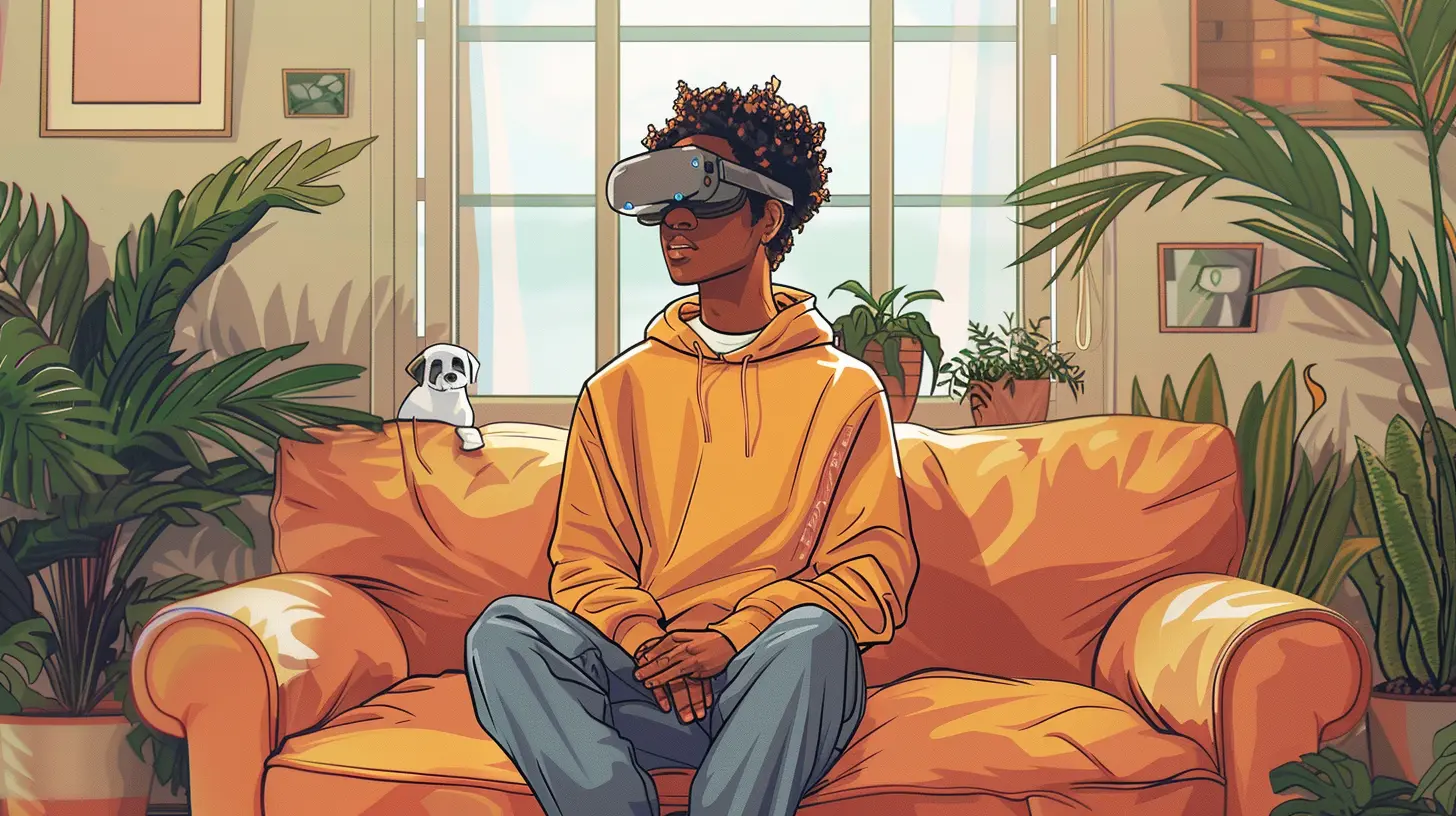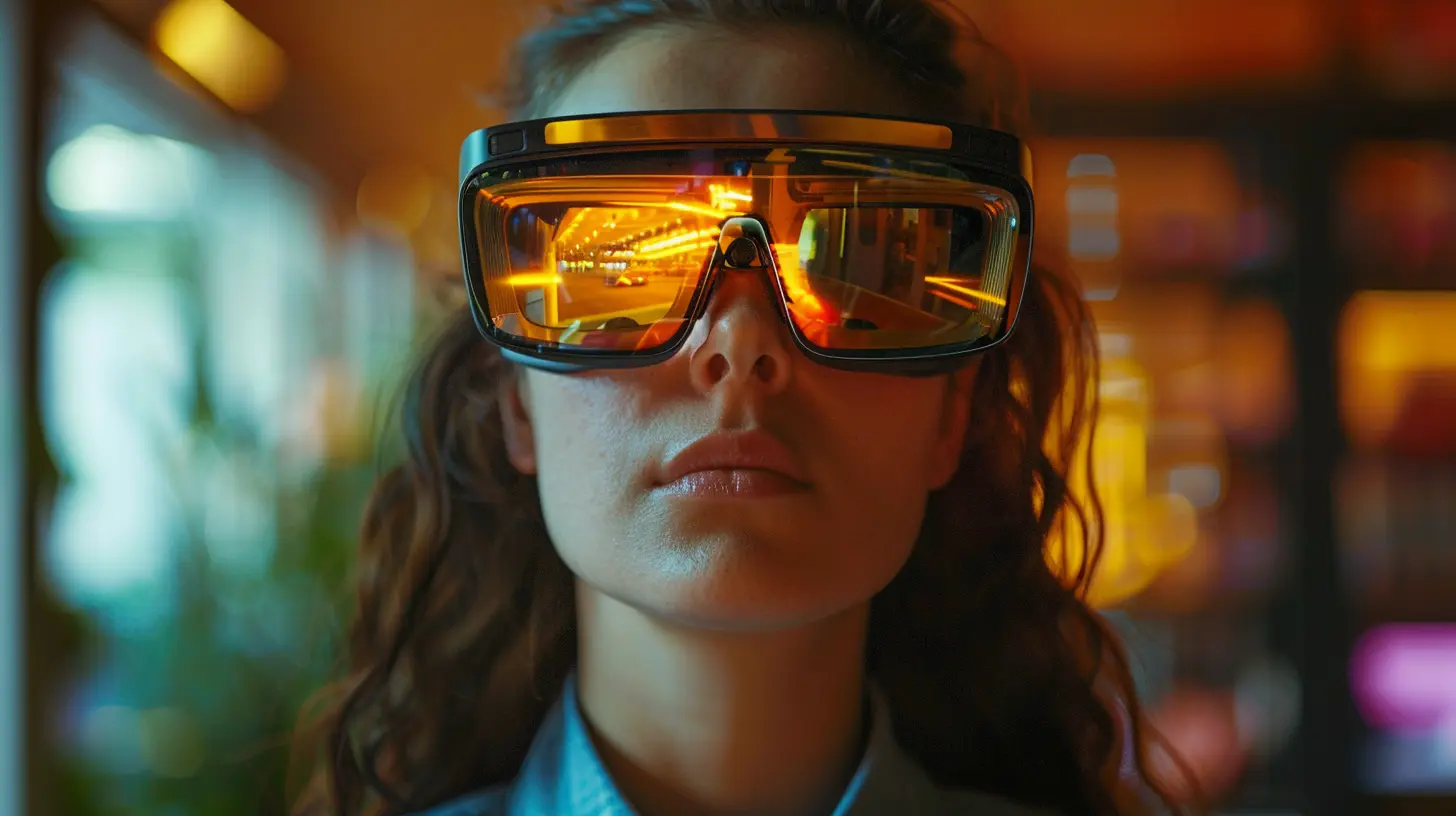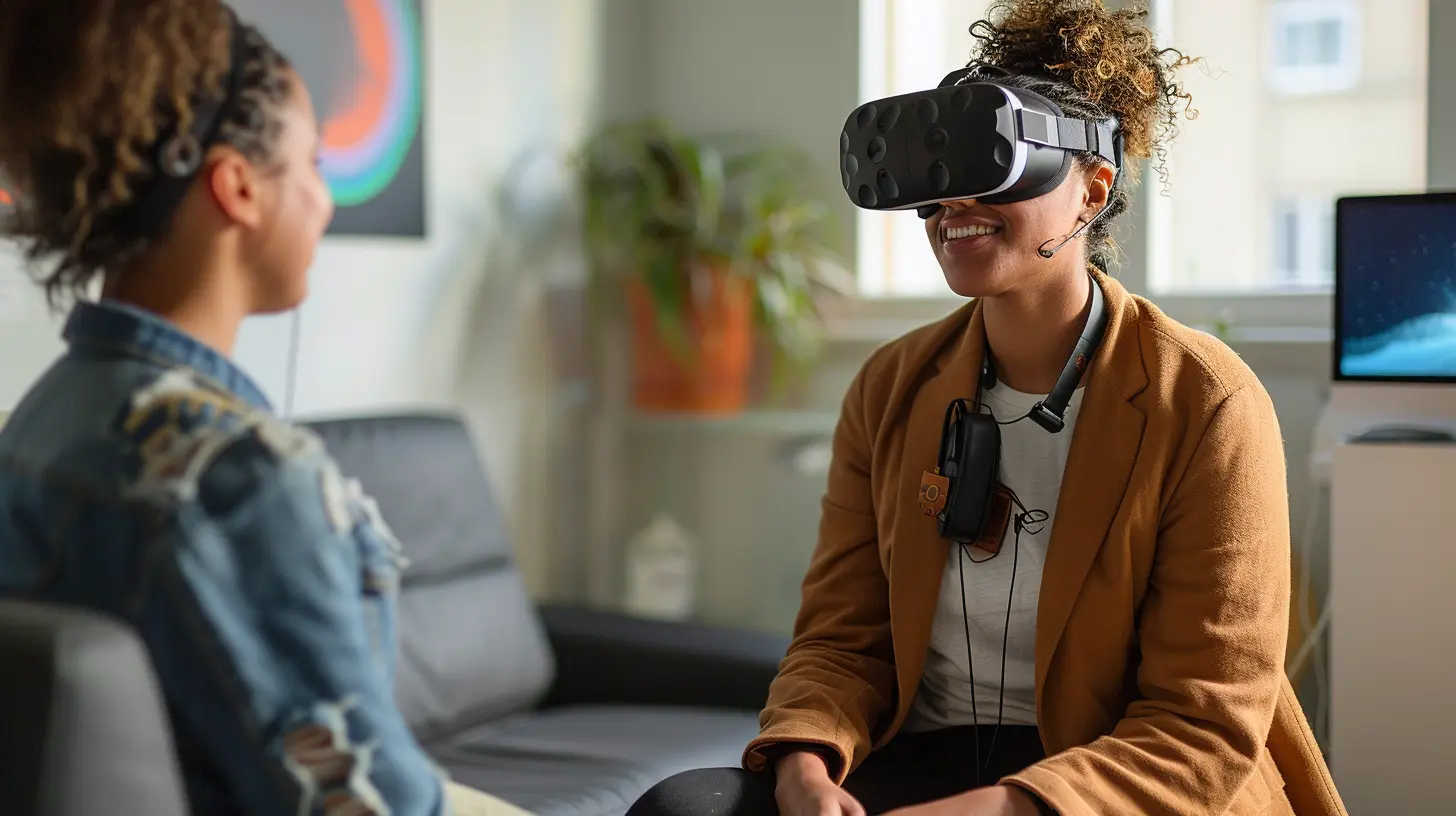Augmented Reality for Mental Health: A New Tool for Therapy
10 December 2024
We all know how far technology has come in the last decade, right? From smartphones that fit in the palm of your hand to virtual assistants that can order your groceries, the tech world is thriving. But what if I told you that technology is starting to play a huge role in mental health therapy? Yeah, you heard that right. One tool, in particular, is creating waves: augmented reality (AR).
Now, I'm not talking about chasing Pokémon in the park with your phone. This is about using AR for something much deeper—helping people navigate through mental health challenges. Sounds futuristic? Well, the future is now! Let’s dive into how augmented reality is changing the game for mental health therapy.

What Is Augmented Reality?
Before we get into how AR can help with mental health, let’s quickly recap what augmented reality actually is. Simply put, AR is a technology that overlays digital elements—like images, sounds, or other sensory stimuli—onto the real world. Unlike virtual reality (VR), which creates a completely immersive digital world, AR enhances the world around you without taking you out of it.You’ve probably seen AR in action through apps like Snapchat, which lets you add fun filters to your face in real-time, or Google Maps, where AR helps you navigate by placing arrows on real-world streets. But AR isn’t just for fun and games; it’s now being explored as a therapeutic tool for mental health.

The Growing Mental Health Crisis
Let’s be real for a second: mental health issues are on the rise. According to the World Health Organization, over 264 million people globally are affected by depression, and that’s just one slice of the mental health pie. Anxiety, PTSD, and other mental health disorders are becoming increasingly common, and traditional therapy methods, while effective, can sometimes fall short due to various factors like accessibility, stigma, or cost.This is where augmented reality steps in like a superhero with a futuristic cape. Imagine being able to receive cognitive behavioral therapy (CBT) from the comfort of your own living room, or confronting your fears without ever leaving your home. Augmented reality has the potential to make mental health therapy more accessible, engaging, and effective.

How AR Can Be Used in Mental Health Therapy
So, how exactly can AR help? Let’s break it down into a few key areas where this tech is starting to show some real promise.1. Exposure Therapy
One of the most common treatments for anxiety, phobias, and PTSD is exposure therapy. This involves gradually exposing someone to the source of their fear in a controlled environment so they can desensitize to it over time.Traditionally, exposure therapy takes place in a therapist’s office or in real-world scenarios (think someone who’s afraid of dogs gradually getting closer to a real dog). But AR can take this to a whole new level. Using AR, a therapist could simulate the experience of the patient’s fear without ever leaving the room. If someone has a fear of heights, for example, AR could create the illusion that they’re standing on a high ledge while they’re safely standing in a therapist’s office.
This makes exposure therapy not only safer but also more convenient. Plus, it can be done at a pace that’s comfortable for the patient, and the therapist can control the intensity of the experience. Win-win, right?
2. Cognitive Behavioral Therapy (CBT)
Cognitive Behavioral Therapy (CBT) is one of the most widely used methods for treating a variety of mental health conditions, including depression, anxiety, and PTSD. CBT focuses on changing negative thought patterns and behaviors.With AR, CBT can become even more immersive and interactive. For instance, an AR app could help individuals visualize their negative thoughts and actively work to change them in real-time. Imagine using an AR headset where each negative thought is represented by a physical object—like a heavy weight—on your shoulders. You can "remove" that object with your hand, symbolizing the process of letting go of that thought. Pretty cool, right?
This kind of visual and physical interaction can help make the abstract concepts of CBT more concrete, which can lead to faster progress in treatment.
3. Mindfulness and Relaxation Techniques
Mindfulness is a great way to manage stress, anxiety, and even depression. It involves staying present and focused on the here and now. But practicing mindfulness isn’t always easy, especially when your mind is racing with a million thoughts.AR can help here too. There are already a few AR apps designed to guide users through mindfulness and meditation exercises, enhancing the experience by using visual and auditory stimuli. Picture this: you put on an AR headset and suddenly you’re in a peaceful forest, with the sound of birds chirping and a calm breeze rustling the leaves. You can practice your breathing exercises while being fully immersed in a relaxing environment, no matter where you actually are. It’s like having a meditation retreat in your own home.
4. Social Skills Training
For individuals with social anxiety or autism spectrum disorders, interacting with others can be incredibly challenging. AR can help provide a safe space to practice these social interactions.Using AR, individuals can engage in simulated social scenarios, like ordering food at a restaurant or making small talk with a coworker. These experiences allow people to practice and build confidence in a controlled, low-pressure environment. And because it’s AR, the scenarios can be tailored to each individual’s specific needs and progress.
5. Mood Tracking and Emotional Awareness
AR can also be used to help individuals track their emotions and moods over time. By incorporating biofeedback (like heart rate or skin temperature) into AR apps, users can visually see how their body responds to stress or anxiety. This can help them become more aware of their emotional states and learn how to manage them more effectively.For example, an AR app might use a color-changing aura that surrounds the user when they’re feeling stressed. As they practice relaxation techniques, they can watch their aura shift from red (stress) to blue (calm). This kind of visual feedback can make it easier to recognize and regulate emotions in real-time.

Advantages of Augmented Reality in Therapy
Okay, so AR sounds pretty amazing so far, but what are the real benefits for therapy?1. Increased Accessibility
One of the biggest barriers to mental health treatment is simply getting to a therapist’s office. Whether it’s due to geographical location, mobility issues, or even the stigma surrounding mental health, many people don’t seek out the help they need.By using AR, therapy can be brought directly into the home. This makes it much more accessible to people who may not have had access before. All you need is a smartphone or AR headset, and suddenly you have a powerful tool for managing your mental health.
2. Cost-Effective
Traditional therapy can be expensive. Between office visits, travel time, and missed work, the costs can add up quickly. AR-based therapy could potentially lower these costs by providing more affordable, self-guided therapeutic options.While AR therapy apps might not replace human therapists (and let’s be honest, they probably shouldn’t), they can offer an affordable supplement to traditional therapy, providing ongoing support between sessions.
3. Personalization
With AR, therapy can be tailored specifically to the individual’s needs. Whether it’s exposure therapy customized to a specific fear, or mindfulness exercises that adapt to the user’s stress level, AR offers a level of personalization that traditional therapy often struggles to achieve.4. Engagement
Let’s face it: therapy can sometimes feel a bit dry. AR has the potential to make therapy more engaging and interactive. By turning therapeutic exercises into immersive experiences, AR can help keep people motivated and invested in their treatment.Challenges and Considerations
As exciting as AR for mental health therapy sounds, it’s not without its challenges.First off, not everyone has access to the technology required for AR therapy. While smartphones are pretty ubiquitous, AR headsets are still relatively expensive and not widely used. Additionally, there’s the issue of privacy and data security. Mental health is an incredibly personal area, and any AR system used for therapy would need to ensure that personal data is kept secure.
Finally, while AR has great potential, it’s still a relatively new field in the world of mental health. More research is needed to fully understand how effective it is in the long term and how it can best be integrated into traditional therapy methods.
The Future of AR in Mental Health Therapy
So, what does the future hold for AR and mental health? Well, it’s looking pretty bright. As AR technology continues to evolve and become more accessible, we’re likely to see more therapists incorporating it into their practices. We might even see a rise in self-guided AR therapy, where individuals can work through challenges on their own time, at their own pace.While AR won’t replace human therapists anytime soon, it can definitely serve as a powerful tool in the therapist’s toolkit. And who knows? In a few years, AR therapy might be as common as traditional talk therapy.
Conclusion
Augmented reality is no longer just a cool gimmick or a fun way to play games. It’s emerging as a serious tool for mental health therapy, with the potential to revolutionize how we approach mental health challenges. From exposure therapy to mindfulness exercises, AR offers a range of applications that can make therapy more accessible, engaging, and personalized.The future of mental health therapy might just be a little more tech-savvy than we ever imagined. And honestly? I can’t wait to see where it goes.
all images in this post were generated using AI tools
Category:
Augmented RealityAuthor:

Ugo Coleman
Discussion
rate this article
22 comments
Zayne McLanahan
Augmented Reality (AR) is revolutionizing mental health therapy by providing immersive, personalized experiences that enhance traditional methods. As this technology continues to evolve, it promises to break barriers, making therapy more accessible and effective. It’s time to embrace AR as a vital tool in mental health care.
March 28, 2025 at 1:06 PM

Ugo Coleman
Thank you for your insightful comment! I completely agree that AR has the potential to transform mental health therapy, making it more accessible and effective. Embracing this technology can indeed create personalized experiences for those in need.
Noemi McLaurin
This article highlights the innovative potential of augmented reality in mental health therapy. Embracing technology like this can offer new, impactful pathways for healing and personal growth. Exciting times ahead!
February 22, 2025 at 11:41 AM

Ugo Coleman
Thank you for your insightful comment! We truly believe that augmented reality has the potential to transform mental health therapy and enhance healing experiences. Exciting times indeed!
Giovanna McClary
Augmented reality offers innovative pathways for therapy, enhancing mental health support in transformative ways.
February 8, 2025 at 9:08 PM

Ugo Coleman
Thank you for your insight! Indeed, augmented reality has the potential to revolutionize mental health therapy by providing immersive and engaging experiences that enhance support and treatment outcomes.
Erica Lane
This article highlights the promising potential of augmented reality (AR) in mental health therapy, offering innovative ways to enhance treatment. However, it’s essential to consider the limitations and ensure ethical implementation, balancing technology with traditional therapeutic approaches for optimal patient outcomes.
February 2, 2025 at 7:39 PM

Ugo Coleman
Thank you for your insightful comment! I completely agree that while AR holds great promise in mental health therapy, addressing its limitations and ensuring ethical use alongside traditional methods is crucial for achieving the best patient outcomes.
Sophie McGill
This article highlights the promising potential of augmented reality in mental health therapy. By creating immersive environments, AR can enhance treatment experiences, making them more engaging and effective. It’s an exciting development that could transform therapeutic practices in the future.
January 28, 2025 at 1:21 PM

Ugo Coleman
Thank you for your thoughtful comment! We're excited about the potential of AR in transforming mental health therapy and enhancing patient experiences.
Adeline Vaughn
Finally, a way to escape my therapist's office without actually leaving! If only they could augment my ability to remember where I parked too!
January 23, 2025 at 7:25 PM

Ugo Coleman
Glad you found the concept engaging! Augmented reality can definitely enhance therapy experiences—who knows, maybe future innovations will help with parking too!
Cadence Green
Who knew therapy could come with such a cool pair of virtual sunglasses? Augmented Reality isn't just for gaming; it's now making our minds healthier too! Next up: a VR couch where you can spill your feelings without the awkwardness!
January 17, 2025 at 4:30 AM

Ugo Coleman
Absolutely! Augmented reality is transforming therapy in innovative ways, making it more engaging and accessible. Who knows what’s next in this exciting evolution?
Preston Vaughn
This article beautifully highlights the transformative potential of augmented reality in mental health therapy. It’s inspiring to see innovative tools paving the way for healing and connection. I’m hopeful that these advancements will help many find the support they need.
January 10, 2025 at 1:49 PM

Ugo Coleman
Thank you for your thoughtful comment! I'm glad you found the article inspiring—it's exciting to see how augmented reality can make a positive impact in mental health therapy.
Marlowe McMeekin
Augmented reality for mental health? Finally, a tech that's more than just flashy—let’s hope it’s as effective as it is cool!
January 5, 2025 at 2:02 PM

Ugo Coleman
Thank you! We’re excited about the potential of augmented reality to enhance therapeutic practices and improve mental health outcomes. Let's hope for its success!
Tobias Evans
Great article! Augmented Reality has immense potential in mental health therapy. It's exciting to see innovative approaches that enhance treatment options and improve patient outcomes.
December 31, 2024 at 11:37 AM

Ugo Coleman
Thank you! I'm glad you found it exciting. AR truly has the potential to transform mental health therapy.
Beatrix Bishop
Thank you for sharing this insightful article! It's heartening to see technology being harnessed to support mental health, offering hope and innovative solutions for those in need.
December 27, 2024 at 7:36 PM

Ugo Coleman
Thank you for your kind words! I'm glad you found the article insightful. It's exciting to see how technology can positively impact mental health therapy.
Vireo Navarro
Augmented Reality offers a transformative lens through which we can explore mental health, bridging the gap between digital and emotional experiences. As we integrate these technologies into therapy, we must remain vigilant about ethical implications and ensure that genuine human connection is not overshadowed.
December 24, 2024 at 4:53 AM

Ugo Coleman
Thank you for highlighting the importance of balancing technology with human connection in mental health therapy. Ethical considerations are crucial as we explore AR's potential to enhance emotional experiences.
Coral Horne
Who needs a therapist on a couch when you can have one in your headset? Augmented Reality: now with 100% less awkward small talk!
December 20, 2024 at 3:35 AM

Ugo Coleman
Thank you for your comment! Augmented reality indeed offers a unique approach to therapy, making mental health support more accessible and reducing barriers like small talk. It's an exciting advancement in the field!
Anika Sweeney
How does AR enhance therapy outcomes?
December 16, 2024 at 3:59 AM

Ugo Coleman
AR enhances therapy outcomes by creating immersive environments that engage patients, reduce anxiety, and facilitate exposure therapy, promoting better emotional processing and coping skills.
Eleanor Reese
Augmented reality is revolutionizing mental health therapy, offering innovative solutions that enhance traditional methods and empower patients in their healing journey.
December 15, 2024 at 5:00 AM

Ugo Coleman
Thank you for your insightful comment! I agree that augmented reality has great potential to enhance mental health therapy and empower patients in their healing journey.
Melanie Simon
Love the idea of using augmented reality for mental health! It’s fascinating how technology can create safe spaces for therapy. Excited to see how this tool evolves and helps people connect in new ways!
December 14, 2024 at 5:10 AM

Ugo Coleman
Thank you! We're excited about the potential of augmented reality to enhance therapeutic experiences and foster connections. Stay tuned for more developments!
Sebastian Acevedo
Augmented reality offers innovative therapy options, enhancing mental health support and patient engagement.
December 13, 2024 at 10:02 PM

Ugo Coleman
Thank you! We're excited about the potential of augmented reality to transform mental health therapy and improve patient engagement.
Emory Hudson
Augmented Reality is revolutionizing mental health therapy by providing immersive experiences that enhance patient engagement and effectiveness. This innovative tool is poised to transform therapeutic practices significantly.
December 13, 2024 at 1:43 PM

Ugo Coleman
Thank you for your insightful comment! Indeed, augmented reality holds great potential to transform mental health therapy by fostering deeper engagement and enhancing treatment outcomes.
Gisela Turner
While augmented reality offers innovative therapeutic possibilities, its effectiveness hinges on accessibility and user engagement. Balancing technology with human connection remains essential for mental health support.
December 11, 2024 at 8:35 PM

Ugo Coleman
Thank you for your insightful comment! I completely agree—accessibility and user engagement are crucial for maximizing the benefits of augmented reality in therapy while maintaining the vital human connection in mental health support.
Lysara Roth
This article opens up fascinating possibilities! Augmented reality could transform mental health therapy by offering immersive experiences. I'm curious about the practical applications and how this technology could complement traditional methods. Looking forward to seeing more developments in this area!
December 11, 2024 at 11:58 AM

Ugo Coleman
Thank you for your insightful comment! We're excited about the potential of augmented reality in mental health therapy and will continue to explore its practical applications alongside traditional methods. Stay tuned for more updates!
Oriel McAuley
Innovative approach; AR could revolutionize mental health therapy!
December 11, 2024 at 3:37 AM

Ugo Coleman
Thank you! We believe that AR has great potential to transform mental health therapy by providing immersive and engaging experiences.
Vesper Bowers
What an exciting exploration of augmented reality's potential in mental health! This innovative approach could truly transform therapy, making it more engaging and effective. Cheers to embracing technology for better well-being—here's to brighter days ahead! 🌟
December 10, 2024 at 5:26 AM

Ugo Coleman
Thank you! We’re thrilled to see the potential of augmented reality in enhancing mental health treatment. Cheers to innovative solutions for better well-being! 🌟
MORE POSTS

Eco-Friendly Smart Homes: A Guide to Sustainable Living

Electric Cars and Road Trips: How to Plan for Long-Distance Travel

How to Choose the Right Bluetooth Earbuds for Your Phone

Best Peripherals for Video Editing: Monitors, Mice, and More

The Role of Open Source in Cybersecurity Defense

How Telecom Companies Are Using Big Data to Improve Services

The Ethics of AI Surveillance: Balancing Security and Privacy

The Rise of Ultra-Wide Monitors: Is it Worth the Investment?

The Impact of Space Robotics on Future Exploration Missions

How Sustainable Tech is Shaping the Future of Fashion

The Evolution of Open Source in Web Development

Portable Bluetooth Projectors: The Future of Mobile Entertainment

Top Mechanical Keyboards for Typists and Gamers Alike